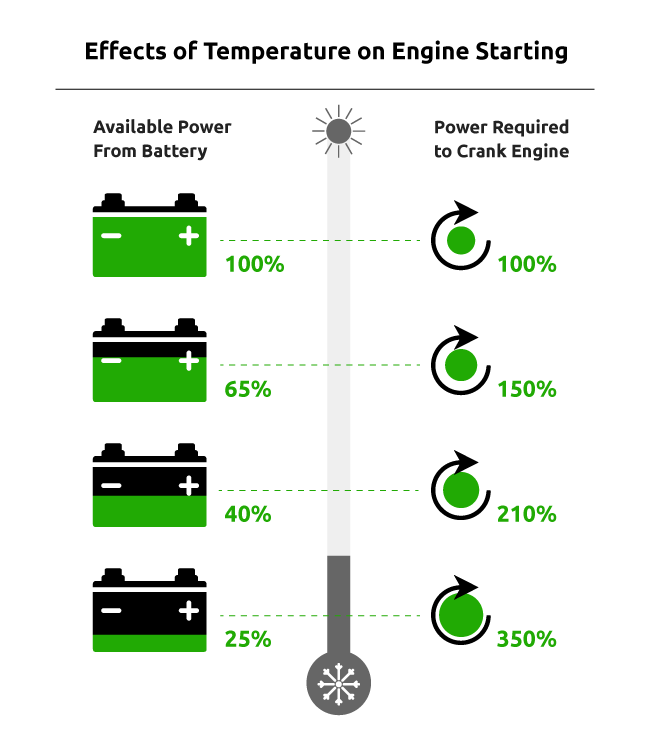How Many Cold Cranking Amps Do I Need For Cold Weather?
- by Bryan Veldboom - updated on 11/19/2021

"Cold cranking amps" is one of those phrases that's commonly tossed around when discussing truck and auto batteries. It's often used as a way of showcasing a battery's capacity, with the implication being that a higher number of CCAs equals a better battery. So, should you buy the battery with the highest number of cold cranking amps? Not necessarily. As with many things, the reality is more complicated than the marketing would have you believe. Today, we'll be taking a deep dive into cold cranking amps, explaining exactly what they measure and how to determine how many CCAs your vehicle requires.
What are Cold Cranking Amps?
Your battery's primary function is to start your engine. It does this by rotating or cranking the crankshaft while simultaneously providing enough voltage to activate the ignition system until the engine fires and maintains this rotation. In order to do all this, your vehicle requires a high discharge of electric current for a short period of time.
Cranking amps (CA) refers to the amount of electrical current a battery can discharge and sustain for at least 30 seconds in normal climate conditions of 32° F. Basically, your cranking amps tell you the amount of power your battery can provide when starting your vehicle at a moderate temperature.
Since cold weather makes it more difficult for the battery to start your engine, the battery industry created an additional standard that measures how well a battery will perform in low temperatures and CCAs were born. Cold cranking amps (CCA) are measured using the same method as cranking amps, but tested at a temperature of 0° F. A battery's CCA rating measures the number of amps a new, fully-charged battery can deliver for 30 seconds while still maintaining the terminal battery voltage of 1.2 volts of current or higher per cell (7.2 volts total for a typical 12-volt car battery). So, for example, a battery with a CCA rating of 250 will produce 250 amps for 30 seconds in a 0° F environment.
How Does Cold Weather Impact Your Battery?
So, why is it necessary to know your battery's CCA rating? It all comes down to the effect cold weather has on your vehicle's battery. Low temperatures slow down the chemical reactions within a battery, causing them to produce less electrical current. In addition, a vehicle's engine oil becomes thicker when it's cold, making it harder to pump through the engine block. For diesel engines, the diesel fuel actually gels in cold weather, taking longer to deliver power to the engine during start-up. All of this puts additional strain on the battery, forcing it to work much harder when turning over the engine. If the battery is low on power, it may be unable to start the engine.

Knowing the CCA rating of your battery gives you a general idea of how well it will deal with the performance issues mentioned above. A battery with a higher number of cold cranking amps has the ability to deliver more power, making it better suited to overcoming the impact of the cold.
How Many CCAs Do I Need for My Vehicle?
The primary factor in determining the number of CCAs necessary to start a vehicle is the size of the engine. The standard recommendation is that a vehicle battery should possess at least one CCA for every cubic inch of engine displacement (two CCAs in the case of diesel engines).
So, what is engine displacement? Engine displacement measures the combined displaced volume of air resulting from the up-and-down movement of the pistons in the engine cylinders. The area of the pistons, how far they travel in the cylinder and the number of cylinders are all used to calculate how much air the engine is capable of displacing.
Fortunately, you don't have to calculate this number yourself, since vehicle manufacturers provide CCA requirements for each model and engine they produce. Check your owner's manual or the manufacturer's website for this information, especially if you purchased your vehicle used. It's possible that the previous owner may have replaced the battery with one that doesn't meet the vehicle's CCA standards. When shopping for a replacement vehicle battery, be sure to purchase one that meets or exceeds the manufacturer's specifications.
What is Considered to Be a Good CCA Rating for a Battery?
A small car can be started with a battery featuring as little as 150 CCAs. Larger vehicles such as pickup trucks and SUVs will require a battery with 400 to 500 CCAs. It's possible to find batteries with CCA ratings as high as 1150. But just because you can find it, doesn't mean that you need it.
The biggest determining factor is climate. If you live in an area where sub-zero temperatures are common, purchasing a battery with a higher CCA rate is a wise investment. If your home town rarely hits zero? Probably not so much. Even if you live in a warm area though, be sure that any battery your purchase meets the minimum CCA requirements of your vehicle.
What Does a Battery's Reserve Capacity Measure?
When it comes to selecting a battery, you'll want to look at more than just the number of CCAs. You'll also want to pay attention to the battery's reserve capacity rating. A battery's reserve capacity tells you the number of minutes a fully charged battery operating at 80° F can discharge 25 amps of power and maintain a terminal voltage equal to or greater than 1.75 volts per cell. The higher the rating, the longer the battery can provide voltage.
So, why is that important? Essentially, reserve capacity helps you determine the best battery for your vehicle's energy needs. In your vehicle's engine, additional applications such as windshield wipers, lights and clocks are powered by the alternator. If your charging system fails, your engine will rely on electricity provided by the battery to power these applications. The higher the reserve capacity, the longer the battery will be able to do this before it becomes drained.
Reserve capacity will also help you gauge a battery's ability to stand up to parasitic drain. You see, when your engine is turned off, those same applications mentioned above continue to draw small amounts of power from your battery. If your reserve capacity is too low, the battery won't have enough power left over to start up your engine the next day.
Does a Battery's Cold Cranking Amps Decrease Over Time?
Over the course of its life, the lead plates inside your battery will gradually deteriorate as your battery is used. As this happens, your battery will lose a portion of its overall capacity, decreasing the number of cold cranking amps. This is one of the reasons that an older battery is more likely to die in cold weather; it no longer has the CCAs necessary to overcome the effects of low temperatures.
If you've had your current battery for three years or longer, it's a good idea to have it looked at. You can test it yourself using the method outlined here, or, bring it to your neighborhood Batteries Plus and have it examined for free. Our experts will test your battery and charging system and let you know if it has the capacity to survive another winter. The test only takes a few minutes to complete, but can end up saving you a whole lot of hassle once the temperature drops.
Batteries Plus Has the Right Battery for Any Vehicle, Budget and Climate
Having trouble finding the right replacement battery? The experts at your nearest Batteries Plus will be happy to help. Or, shop our selection of batteries for cars and trucks online.
Do you live in an area with especially cold winters? Our X2Power brand batteries are engineered for high demand starting applications that require a large reserve capacity. They also last longer and recharge faster than other AGM batteries. Learn more about X2Power batteries, then shop X2Power auto batteries on our site. While you're there, check out our last Expert Series blog entitled "How Does a Car Battery Work?" for an in-depth look at how an auto battery functions.